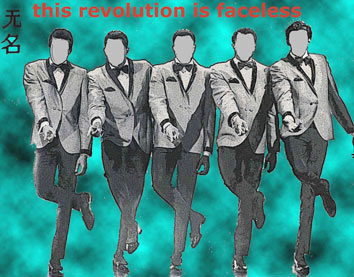
1. Luther Blissett Project (1994-99)
"Luther Blissett" is a multi-use pseudonym, an "open
reputation" informally adopted and shared by hundreds of artists, hackers
and social activists all over Europe since Summer 1994.
For reasons that remain unknown, the name was borrowed from a 1980's British
soccer player of Afro-Caribbean origins.
In Italy, between 1994 and 1999, the so-called Luther Blissett Project
(an organized network within the open community sharing the "Luther Blissett"
identity) became an extremely popular phenomenon, managing to create the legend
of a sort of folk hero, a Robin Hood of the information age playing media
pranks, planting fake stories in the national press, running unorthodox solidarity
campaigns for victims of repression etc.
The novel Q, by now a huge success across the Old Continent, was written
by four Bologna-based members of the LBP and published in Italian in 1999.
So far, it has been translated in English, Spanish, German, Dutch, French,
Portuguese (Brazilian), Danish and Greek.
Besides the complexity of the plot and its allegorical values, the fact that
the book was published with a kind of "copyleft" notice caused quite
a sensation among those who ignored that the practical critique of intellectual
property had been at the core of the LBP's activities.
December 1999 marked the end of the LBP's Five Year Plan. All the "veterans"
committed a symbolic seppuku (samurai ritual suicide, a few years before
samurais became trendy). The end of the LBP did not entail the end of the
name, which is still adopted by many people.
If you want to know more about Luther Blissett and/or the LBP, check www.lutherblissett.net
2. Wu Ming (since 2000)
In January 2000, a fifth person joined the four authors of
Q and a new band of authors was born, Wu Ming (chinese for "anonymous").
Since then, we have authored further novels and essays. So far, our major
collective effort has been 54, a novel set in 1954, with dozens of
lead characters (including actor Cary Grant), also translated in several European
languages. The book was an inspirational source for the Italian folk-rock
band Yo Yo Mundi whose
concept album (also titled 54) was released at the beginning of 2004.
The "solo" novels of two members of the band (Wu Ming 2 and
Wu Ming 1) are going to be published in Italy by the end of 2004. This
is not unprecedented: Wu Ming 5's novel Havana Glam
was published in 2001.
We have also written the screenplay for Guido Chiesa's movie Lavorare
con lentezza [Working Slow], which will hit Italian theaters in September
2004.
Because of our
position on copyright, our experiments in collective writing, the hundreds
of meetings with the readers we held in Italy and abroad and - last but not
least - our involvement in social causes Wu Ming is now getting even more
famous than the LBP ever was.
The band's name is meant both as a tribute to dissidents and a refusal of
the role of the "Author" as a star.
The identities of the five members of Wu Ming are not secret, only we think
our work is more important than our biography or our faces.
Each member of Wu Ming has a nom de plume composed by the name of the
group plus a number (it depends on the alphabetical order of our last names).
Riccardo Pedrini = Wu Ming 5
Federico Guglielmi = Wu Ming 4
Luca Di Meo = Wu Ming 3
Giovanni Cattabriga = Wu Ming 2
Roberto Bui = Wu Ming 1
